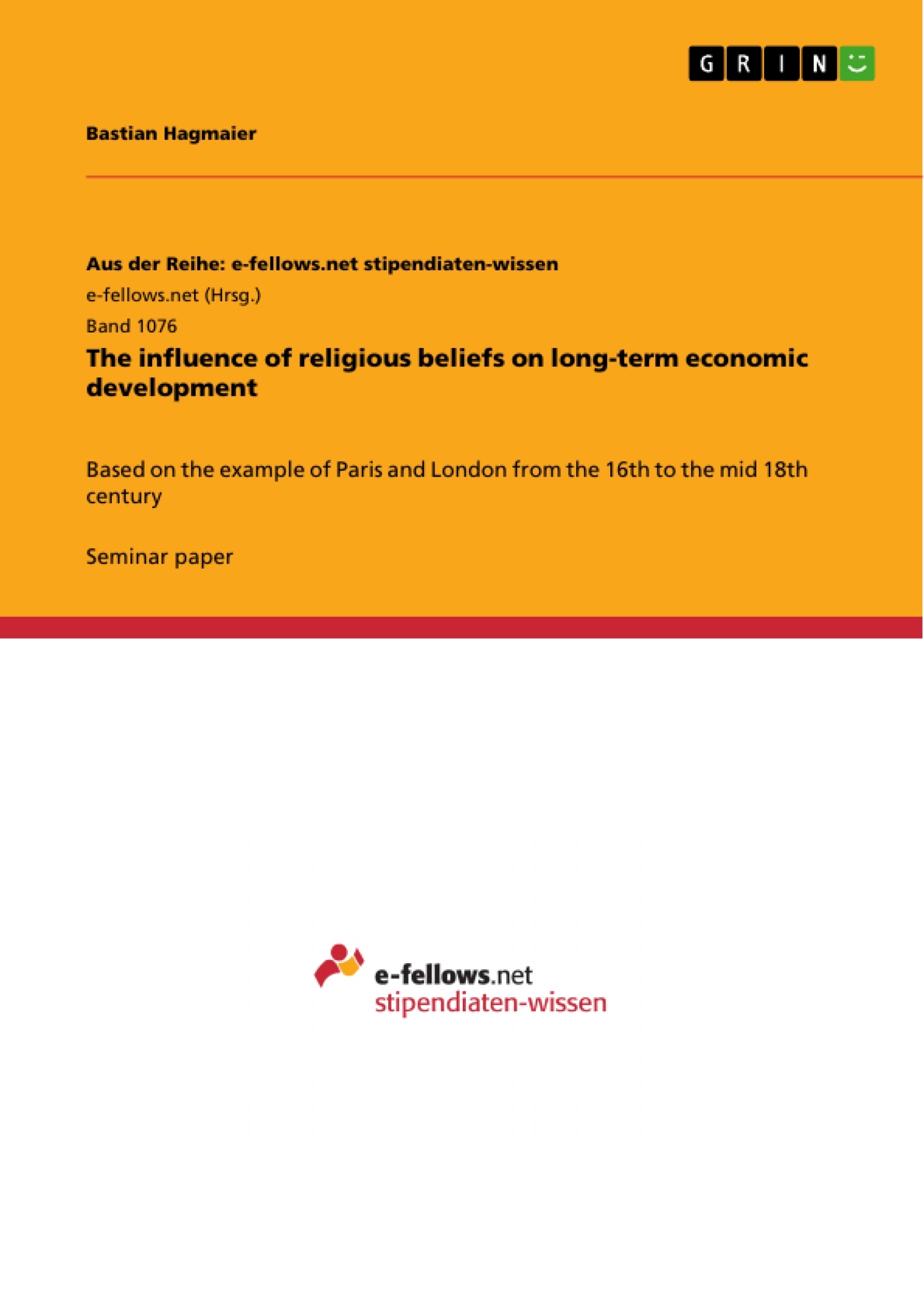This historical analysis will examine the influence that religious beliefs have on long-term economic developments, which are shown using the example of Europe at the height of the Renaissance and on its way towards Industrialisation, between 1500 and 1750. This relationship will be examined on the basis of two specific cities, the mainly catholic French capital, Paris, and the Protestant English city London.
During this time, the whole of Europe was undergoing huge changes in all dimensions of society. The protestant reformation began in the 16th century, quickly followed by the foundation of the Church of England which then also leads over to the English reformation. Only a few decades later the Thirty Years War broke out in Germany as well as the English Civil War taking place in the middle of the 17th century. One main indicator of this new direction of development are the rising and falling wages across all nations. While most of the traditional catholic southern countries go in a phase of regression, most protestant cities are flourishing and gaining more and more importance. This leads to the point of rating religion in this process.
The religious group a society belongs to influences their individual behaviour. According to Weber’s “Protestant Ethic” being of protestant belief is an advantage compared to catholic ethics, especially in terms of economic development. This dependence is analysed based on two major cities Paris and London as they both have quite a high population as well as remarkably different evolution during this time.
Inhaltsverzeichnis (Table of Contents)
- Introduction
- Analysis of Weber's "Protestant Ethic"
- Religious influence
- Economic success
- Europe in 1500
- Comparison of Paris and London
- Measurement of economic development
- Population growth
- Real wages
- Literacy levels
- Network ability
- Intermediate result
- Europe at the edge of industrialisation
- Conclusion
Zielsetzung und Themenschwerpunkte (Objectives and Key Themes)
This historical analysis aims to examine the influence of religious beliefs on long-term economic developments, focusing on the example of Europe during the Renaissance and its transition towards Industrialisation between 1500 and 1750. The study specifically compares Paris and London to highlight the potential relationship between religious affiliation and economic growth.- The impact of religious beliefs on individual work ethic and economic development.
- The historical context of Europe in the 16th and 17th centuries, including the Protestant Reformation and the Thirty Years War.
- The economic differences between Paris and London, particularly during the period under study.
- The role of Max Weber's "Protestant Ethic" in explaining economic success and its limitations.
- The evolution of religious beliefs and their influence on societal structures during a period of significant change.
Zusammenfassung der Kapitel (Chapter Summaries)
- Introduction: This chapter sets the stage for the analysis, outlining the scope of the study and the key questions it aims to address. It introduces the historical context of Europe between 1500 and 1750, highlighting the major societal shifts that occurred during this period, including the Protestant Reformation and the Thirty Years War. The chapter also emphasizes the significance of religious beliefs in shaping individual behavior and economic activity.
- Analysis of Weber's "Protestant Ethic": This chapter delves into Max Weber's influential work, "The Protestant Ethic and the Spirit of Capitalism," which proposes a connection between Protestant beliefs and economic success. It examines Weber's key arguments about the role of religious influence on work ethic and the development of a "Protestant Ethic" that emphasizes hard work, frugality, and individual achievement.
- Religious influence: This chapter explores the specific ways in which religious beliefs, particularly Protestant beliefs, influence individual work ethic and economic behavior. It discusses how religious tenets can shape personal values, attitudes towards work, and economic decision-making.
Schlüsselwörter (Keywords)
This study examines the complex relationship between religious beliefs, individual work ethic, and economic development, using the historical context of Europe in the 16th and 17th centuries. Key terms include: Protestant Ethic, religious influence, economic development, Reformation, Thirty Years War, Paris, London, population growth, real wages, literacy levels, network ability, Max Weber.Frequently Asked Questions
How do religious beliefs influence economic development?
The study examines how religious groups influence individual behavior and work ethic, potentially leading to different economic outcomes for societies.
What is Max Weber's "Protestant Ethic"?
It is a theory suggesting that Protestant beliefs, emphasizing hard work and frugality, provided an advantage for economic development compared to Catholic ethics.
Which cities are compared in the analysis?
The analysis compares the mainly Catholic city of Paris with the Protestant city of London between 1500 and 1750.
What time period does the study cover?
The study focuses on the era from the high Renaissance towards the edge of Industrialisation, specifically between 1500 and 1750.
What indicators are used to measure economic development?
Indicators include population growth, real wages, literacy levels, and network ability.
- Arbeit zitieren
- Bastian Hagmaier (Autor:in), 2013, The influence of religious beliefs on long-term economic development, München, GRIN Verlag, https://www.grin.com/document/286366



